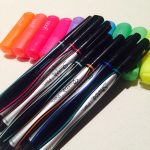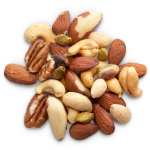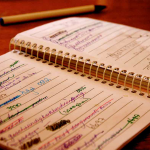
I have a few family members that deal with Attention Deficit Disorder (neither really have the hyperactive part of ADHD), so we’ve been exploring different ways to help them be successful in middle school, high school, and beyond. We try to use natural means of helping with this whenever possible. Here are some things we’ve tried that have helped them.
1. Get Multiple Colored Pens & Highlighters for Lectures

For example, when your history teacher is lecturing on WWI, use a blue pen for information on Germany, then switch to green for Italy, red for Russia, purple for France, etc. Highlight dates in yellow, places in pink, and people in orange.
Not only are these good note-taking skills; the constant switching of pens forces your brain to pay attention and stay on track. So use any color-coded system you like that requires frequent exchanges. The constant motion helps keep your mind from wandering off. This is especially great with teachers or subjects you don’t find particularly interesting.
2. Get a White-Noise App
While having your favorite music or TV show playing while you work can sound like a good idea, it’s very distracting. But people with ADD or ADHD often have trouble working in complete silence as well.
I don’t remember who originally told me about these, but they are amazing. And there are dozens of free apps available. White noise music or tones create a simple, non-distracting background noise. It’s as if my brain has a few tracks running, and the white noise fills up the extra space while I focus on the one thing in front of me. .
3. Keep Suitable Snack On-Hand at all Times
Halfway through my day, my brain just starts to feel tired. And when my brain gets tired, it usually gets distracted much quicker.

It’s good to keep a few ADD-friendly snacks with you for these occasions. When your brain needs a little kick-start, just pull out a ziplock bag and discreetly have a quick snack. My usual assortment includes:
- Almonds, pistachios, or peanuts (don’t take these into a nut-free school, but they are fine in a home where no one is allergic)
- Dark chocolate
- Pumpkin or Sunflower Seeds
- Banana
- Energy bites/bars with oatmeal, peanut butter, quinoa, chia, etc.
- Babybel or string cheese (if you can keep it cold)
- Berries
Avoid any high sugar or simple-carb snack during classes, and instead pack snacks high in protein, omega-3s, complex carbs, zinc, and iron. It sounds kind of daunting at first, but these nutrients are key to staying focused in class, and come in tons of different snacking foods.
4. Write it Down!

Keep a small (or large) notebook just for when random thoughts come up. So, when you’re in Chemistry and your brain bounces around and you remember that you have to email your counselor, need new highlighters from the store, or wonder if cats like peanut butter, just write it down immediately, then return your focus to Chemistry.
This way, you are not suppressing the way your mind works; you address each thought, momentarily deal with it, then return to what you were doing. Your brain eventually picks up on this pattern, and it becomes easier to control where your thoughts go. Just keep a running list, check it when you get home or to your dorm, and cross off each item once you deal with it.
5. Exercise Before Class, Not After
I know, I know, getting up earlier before classes is not fun. You would so much rather sleep in. But not that much time is needed– a quick 15 minute run will suffice! But check if your school has a morning class or club you can join. This ensures you get enough exercise and gives you more motivation to wake up.
If not, make up your own workout and tailor it to what you enjoy. Jogging, sprints, weight lifting, pilates, and circuits will all work. You can even create your own circuit in your dorm room- super easy! Write down how many laps/reps you plan to do ahead of time though; don’t just stop when you get a little tired.
Exercising releases chemicals in the brain- including neurotransmitters and dopamine, which improve focus. But this doesn’t really do you a lot of good if you wait to work out until after classes!
6. Find or Create a Space You Can Work In
Figure out what environment you need to study in. Whether it’s cleaning off your desk, emptying the wall in front of it, shutting the door, or putting your phone away. Try different things until you figure out what works. Most libraries have private study/work rooms that you can use, so take advantage of these!
Put away anything that is distracting. Turn on your white noise, and get to work. It’s best to work in 20-30 minute sessions, breaking to walk around or have a quick snack. During your breaks, do not scroll through your social media feed. No Facebook, Instagram, or Pinterest. When you scroll through the latest photos, recipes, and inspirational quotes, you brain won’t want to stop. You’ll crave it again in five minutes when you return to writing your paper, so just avoid it for now.
I hope these tips help you or someone you love. Please comment with anything that you’ve found to be helpful.
Thanks for stopping by!
~ Suzanne





Leave a Reply